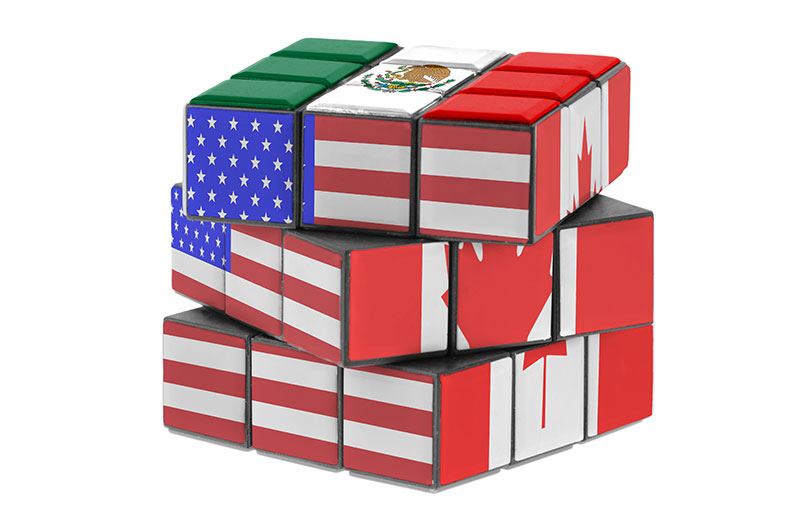
Renegotiating NAFTA: What's the Canadian impact?
The United States government is making waves as it re-evaluates the terms of the North American Free Trade Agreement (NAFTA) with Canada and Mexico. Proposed changes could have far-reaching implications for the global economy, including Canadian businesses and the future of trade, as American policy turns toward protectionism with increased tariffs and quotas.
MODERNIZING NAFTA: CHALLENGES AND OPPORTUNITIES
Canada may bear the brunt of these changes as America’s primary trade partner. Negotiations are in the works, with a focus on areas such as rules of origin, supply management and dispute settlement, as well as provisions that account for intellectual property rights and the rise of the digital economy.
Revisions to NAFTA offer a mix of drawbacks and potential as priorities for each country continue to shift and compete. Canada and the U.S. do not see eye to eye on a number of issues that a modernized NAFTA will affect, like increased access to professional visas and more equitable labour laws.
The NAFTA outlook has direct ramifications on Canadian business, economics and policy. Right now some of the top considerations relevant to Canadian interests are:
- job creation: creating well-paid jobs with increased geographic mobility
- free trade: preserving Chapter 19 for import/export tariff settlements
- the environment: prioritizing climate change adaptation and energy innovation
- investments: maintaining and enhancing economic activity in North America
As a CPA, you need to understand the evolving North American business climate and make smart, strategic decisions for your practice.
Ensuring mutual benefit is the driving force behind NAFTA’s economic success, so compromise is key. The Canadian government is keen to emphasize this sentiment, insisting that Canadian negotiators remain fully focused on the talks and collaborative outcomes. “We will continue to work seriously and respectfully to improve NAFTA to benefit not just Canadians, but our American and Mexican friends as well,” said Prime Minister Justin Trudeau.
REIMAGINING TRADE FOR NORTH AMERICA
Depending on your industry or sector, some elements of the Canadian agenda could carry more weight than others. However, all NAFTA changes will create a financial and logistical blueprint that must be reconciled. This includes related opportunities for trade competition and cooperation that are emerging in the wake of NAFTA, such as the Canada-European Union Comprehensive Economic and Trade Agreement (CETA) and the Trans-Pacific Partnership (TPP).
We already know that a steady flow of skilled workers and goods is important for the success of all NAFTA parties. And for many organizations that do business in North America, profit and performance are directly connected to smooth cross-border transactions and cooperative Canada/U.S. operations.
Businesses need CPAs to be innovative in change management, as well as leaders who can analyze critical information and offer guidance about how to optimize NAFTA outcomes – whether that’s offering a better understanding of capital markets, enacting measures to reduce cybersecurity risk or helping small business owners plan for the future.
Get the latest insight on NAFTA thought leadership, legislative developments and global impact at this upcoming event for mid- to senior-level business and accounting executives:
Doing Business in North America Conference
In-person conference | Chicago, IL | CPD: 14 hoursCo-presented by AICPA, CPA Canada and the Instituto Mexicano de Contadores Públicos